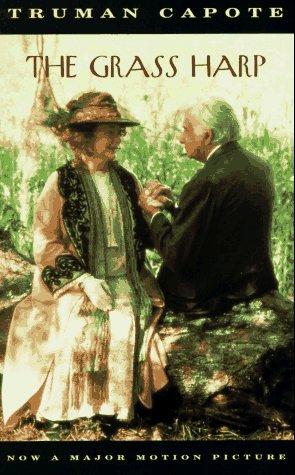Julia_98 reviewed Grass Harp, The by Truman Capote
Whispers in the Trees: Reflecting on Truman Capote’s The Grass Harp
4 stars
Reading The Grass Harp by Truman Capote felt like stepping into a world suspended between reality and dream, a place where innocence, eccentricity, and quiet rebellion coexist in delicate harmony. Originally published in 1951, the novella is a lyrical meditation on individuality, belonging, and the fragile beauty of chosen families.
The narrative is filtered through the eyes of Collin Fenwick, an orphaned boy who is sent to live with two elderly cousins in a small Southern town: Dolly, a gentle, intuitive woman who concocts homemade herbal remedies, and Verena, her domineering, business-minded sister. When Verena tries to exploit Dolly’s secret recipe for profit, a conflict unfolds. In response, Dolly, accompanied by Collin and her loyal friend Catherine, retreats into a treehouse — a physical and symbolic space of resistance and self-affirmation.
What captivated me most was Capote’s gentle voice, his ability to observe characters without judgment, and his …
Reading The Grass Harp by Truman Capote felt like stepping into a world suspended between reality and dream, a place where innocence, eccentricity, and quiet rebellion coexist in delicate harmony. Originally published in 1951, the novella is a lyrical meditation on individuality, belonging, and the fragile beauty of chosen families.
The narrative is filtered through the eyes of Collin Fenwick, an orphaned boy who is sent to live with two elderly cousins in a small Southern town: Dolly, a gentle, intuitive woman who concocts homemade herbal remedies, and Verena, her domineering, business-minded sister. When Verena tries to exploit Dolly’s secret recipe for profit, a conflict unfolds. In response, Dolly, accompanied by Collin and her loyal friend Catherine, retreats into a treehouse — a physical and symbolic space of resistance and self-affirmation.
What captivated me most was Capote’s gentle voice, his ability to observe characters without judgment, and his way of capturing fleeting emotional truths. The treehouse becomes a sanctuary not just from societal norms, but from the inevitability of growing up. It’s a space where vulnerability is allowed, and where silence often speaks louder than words.
Capote doesn't rely on dramatic action; instead, he builds emotional depth through small gestures and quiet moments. The story’s power lies in its subtlety — in the way grief, friendship, and identity quietly unfold beneath the surface.
The title metaphor, the “grass harp,” evokes the sounds of wind whispering through blades of grass — the voices of the misunderstood and overlooked. In that sense, The Grass Harp is a celebration of the misfits, the dreamers, and those who choose love and freedom over conformity.
For me, reading this novella was a soft, unforgettable experience — a reminder that sometimes, the most profound truths are spoken in the gentlest tones.

